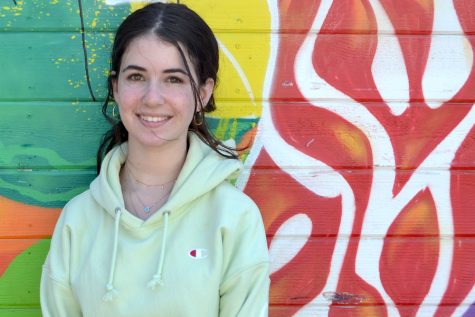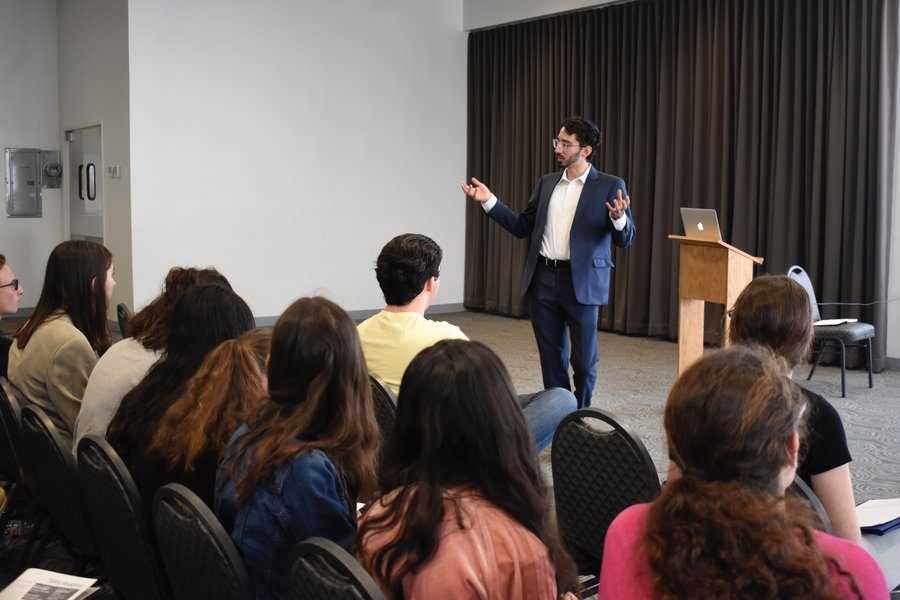Annual JSPA conference helps students see journalism through Jewish lens
ADVOCATE: Eitan Arom, former senior writer at the Jewish Journal, told JSPA attendees how journalism can represent the downtrodden while still being true to journalistic principles. He has publicized of the plight of the Yazidi minority in Iraq.
About 40 young journalists mingled in a high-ceilinged multi-purpose room, snapping photos on digital cameras and wielding pencils, notebooks and laptops. The air filled with the buzz of meeting new people and the energy that comes with a day off of school. Some munched on sprinkle cookies and sipped tea, and some introduced themselves to unfamiliar faces.
But the three-day event they had arrived for was not being held in a school or convention center. It was at a local shul — Beth Jacob Congregation in Beverly Hills, which was hosting the fifth annual convention and Shabbaton of the Jewish Scholastic Press Association.
Held Feb. 1 – 3, it was the group’s biggest conference to date, with participants from Atlanta Jewish Academy, Margolin Hebrew Academy of Memphis, Tenn., and Charles E Smith Jewish Day School of Rockville, Md., as well as Shalhevet, Milken, De Toledo, Hamilton and Harvard-Westlake high schools in Los Angeles.
Beth Jacob’s Rabbi Kalman Topp gave the opening talk on Thursday morning, about Jewish ethics in journalism. He explained the connections between those two seemingly unrelated topics.
“Journalism educates and informs people,” Rabbi Topp told the group gathered in his synagogue’s social hall. “I think it is a Jewish value, and Judaism believes that it’s important for a Jew to be informed. Only if we are informed about what’s going on in the world, in our community, in our school, will we be involved.”
The Torah supports this, he said. For example, in Parshat Pekudei, which he said translated to “accountings and reckonings,” Moses is challenged about a missing 1,775 shekels. Some criticize anyone who would question him, but the text shows that Moses passes the test, bolstering everyone’s confidence in their leadership.
“A great value of journalism is that it holds leaders accountable,” said Rabbi Topp. “It was incredible to think that the Jewish people had questions about the action and leadership of Moshe… so that is a value of journalism…
“Human beings don’t work well when there is no accountability,” he continued. “I think journalism helps create that culture of holding leaders and individuals in the community accountable.”
According to its website, JSPA focuses on “looking at journalism through a Jewish lens.” It accomplishes this by sharing ideas, presenting workshops that give insight on journalism with themes revolving around Judaism, and also giving out awards to articles with Jewish subjects. There were workshops on Thursday and Friday and more discussions and lectures on Shabbat.
The conference is cosponsored by the American Jewish Press Association and Shalhevet and led by Ms. Joelle Keene, faculty adviser of The Boiling Point, who explained the ties between Judaism and journalism. JSPA’s motto is the verse from Vayikra: “Do not go about being a talebearer among your people, but do not stand idly by the blood of your neighbor. I am the Lord.”
“Many of the things that people criticize journalism for, and get upset about journalism for, could be solved by just following Jewish values,” Mrs. Keene said in opening the conference Thursday morning. “So by keeping a Jewish perspective on what we’re doing, we could make our journalism more important, more impactful, and better, and that’s what we’re here to learn how to do.”
This opening statement set the tone for the rest of the weekend. There were workshops on how to cover Israel and Jewish-related topics in college media, given by Shalhevet alumnus Zev Hurwitz ‘11; on using journalism to heal the world, given by Jewish Journal reporter Eitan Arom; and on Jews’ responsibility in opinion writing in mainstream media, given by Pepperdine University law professor Dr. Avi Helfand, who also teaches a course at Shalhevet.
The Shabbat portion of the conference featured a Friday night dinner and talk by keynote speaker Ari Goldman, a professor at Columbia University’s Graduate School of Journalism and former religion reporter for the New York Times.
Prof. Goldman described reading the New York Times as a child on his way to yeshiva in the morning, and being told by his rabbis that he should study his Gemara instead and read the paper by getting up a little earlier.
He also said that while he has studied and written about many religions and respects the deep truths in them all, Judaism is the truest to him. He compared Judaism to his wife, the writer Shira Dicker who also spoke at the conference, who he said was the most beautiful and perfect woman in the world — for him.
Judaism was not the only topic discussed at the conference. Sports reporting, copyright law, news photography and how to cover your own community were also taught.
Jennifer Medina, National Correspondent for the New York Times, talked about covering disasters and described how to go about interviewing someone who was a victim. She said saying “I’m sorry for your loss” wasn’t really helpful, but that the way to express solidarity was just to ask questions and listen. People who are suffering, she said, want to be heard.
“The most effective way to get people to talk is to be polite and respectful and empathetic, and really listen to people,” said Medina.
Los Angeles Times Senior Calendar Editor Richard Nordwind described the role of movie, music, art and other reviewers in the internet age. Jessica Nassau, adviser of the Lion’s Tale at Charles. E. Smith, gave two workshops on page design.
Kathleen Neumeyer, former faculty adviser of the Harvard-Westlake Chronicle, brought a new question to the floor: what is the point of high school journalism?
“What’s your purpose?” Ms. Neumeyer asked the group. “Who are you?” She then asked the audience a series of questions to get them to think about this.
Attorney Joseph Lipner gave a lecture titled “Freedom of the Press in Religious High Schools,” and brought hypothetical high school news stories he had written for students to analyze in terms of what parts might be libelous.
And Boiling Point editors Hila Machmali and Gilad Spitzer gave a lecture called “Tales From the Cutting Edge,” in which they described staff roles and workflow for the website, including managing mistakes and push notifications.
“Gilad and I spoke about what it’s like running the Boiling Point website, what we found works and what does not work in the past few years,” said Hila. “We also spoke about the process of developing the app and what we found was successful and not successful throughout the process.
“It was a great opportunity to be able to share your experience with other newspapers,” added Hila.
The conference concluded on Saturday with Shabbat lunch and the highly-anticipated moral dilemma, in which participants discussed a scenario in which a top high school basketball player decides not to play his senior year, and the school paper publishes a story about it.
The basketball player then asks the paper to take the article down from the internet until he gets his college acceptances, to prevent it from hurting his chances.
Most students thought the paper should take the story down, but a vocal minority said it should stay up, and a lively debate followed. When it was over, at least one student had changed his mind.
It was JSPA’s fifth conference, and some students had come for the second or third time. Mira Berenbaum, editor-in-chief of The Roar at Milken Community Jewish High School, was at the conference for the second year in a row.
“I learned so many valuable skills last year that I wanted to come back,” Mira said. “I was able to bring two of our younger staff writers so that they can continue the legacy once I leave.”
Yisrael Wiener, a junior at Margolin Yeshiva Boys High School in Memphis, attended for the first time.
“I want to learn about other papers, how I can apply things from other papers to my paper,” said Yisrael. “I want to become a better writer, journalist.”.
Shalhevet sophomore Neima Fax appreciated how different each session was from the other sessions.
“Each person came from a different background and had different stories to tell from their different experiences, which really showed in what they taught us,” Neima said.
“I learned a lot. Even though I’m just the photo editor and I don’t write articles, I still found it interesting to hear all of the stories from the journalists.”
Another feature event of the conference was the award ceremony, which took place Friday night. Awards were given to students who submitted prize-worthy articles, layout pieces, photographs and videos having to do with Judaism.
Boiling Point Editor-in-Chief Hannah Jannol won the Grand Prize in Jewish Scholastic Journalism for her story about what it was like to be the child of a rabbi. But the school with the most winning entries was Charles E. Smith of Maryland, which won five first-place awards, including first prize in Ongoing reporting on religious, Israel or Interreligious/intercultural issues, News or feature reporting on interreligious/intercultural issues, Layout/design of any Jewish or Israel-related story and News reporting on Jewish religion.

Kate Orlanski joined the Boiling Point as a staff writer during her freshman year and now serves as Features editor during her junior year. Outside of journalism, she is co-chair of the Young Americans for Freedom club, a member of the Model Congress team and secretary of the Agenda Committee.








